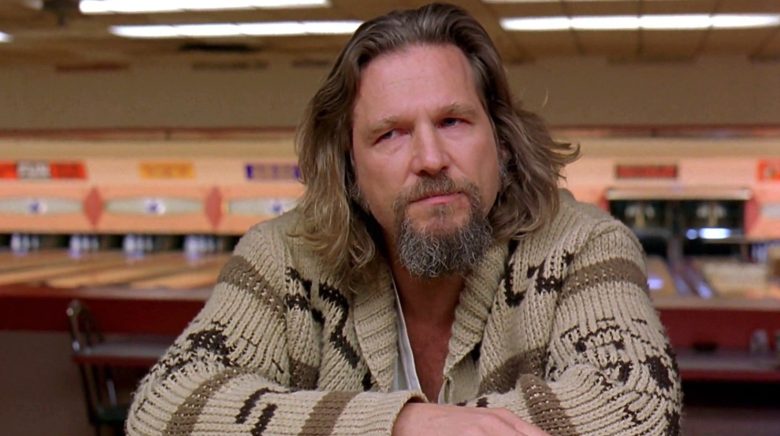The Big Lebowski… If It Was Written to the ‘Hero’s Journey’ Formula
Last week, I wrote about one of the most famous and well-used narrative structures: the Hero’s Journey. If you want to appeal to the masses, the argument goes, the Hero’s Journey structure has connected to us for thousands of years. I also promised I would rewrite a plot line that did not use the formula, such as the Coen Brother’s The Big Lebowski.
Some people claim that the Hero’s Journey is so integral to storytelling that its fingerprints can be found on every single successful movie made. I really dispute that claim. Because, while a central driving force of the Hero’s Journey is transformation, some movies contain characters who remain the same from start to finish.
Enter, stage left: The Dude.

How do we know The Big Lebowski doesn’t follow the Hero’s Journey?
I’ve been a Coen Brothers fan since their first low budget crime thriller Blood Simple. The film came out in 1984, an appropriate year for filmmakers with a darkly-comic, nihilistic vision of humanity to make themselves known. While other filmmakers dealt with broad human themes involving battles of good vs evil, the Coen’s often have their major turning points happen by chance.
In a sense, you might say this is a truer version of the world than one where we’re protected by the actions of mighty heroes. Watch enough Coen Brother’s movies and you’ll start to believe life is something of a sick joke that a bunch of sentient beings find themselves in – for good or ill. On the other hand, thousands of years of human myths (as boiled down in the Hero’s Journey) have depicted our path as something he or she creates for themselves.
The Big Lebowski – Storline
So here’s The Big Lebowski plot, as seen in the movie by Joel and Ethan Coen. You’ll see it involves a lot of misunderstandings, which is all part of the Coen’s trademark dark humour:
Jeffrey “The Dude” Lebowski is a middle-aged bachelor whose main focus is cannabis and bowling. The Dude is assaulted by two guys hired by pornographer Jackie Treehorn, who demand money owed by the wife of another Jeffrey Lebowski (aka “Big Lebowski”).
When they realise they have the wrong man, one of them urinates on the Dude’s rug and they leave.
His bowling partners, Donny Kerabatsos and Vietnam vet Walter Sobchak, suggest the Dude seek compensation from the other Lebowski. But, despite his wealth, he refuses. So the Dude steals a valuable rug instead, then meets Bunny, the Big Lebowski’s young wife.
Later, the Dude discovers Bunny has been kidnapped. And now Big Lebowski wants the Dude to deliver the ransom money. Meanwhile, two more thugs knock the Dude unconscious and take his new rug.
The kidnappers arrange a meeting with the Dude. But the plan is to give them another briefcase containing Walter’s “dirty undies” and they will keep the ransom money for themselves. The kidnappers take the false case, but later the Dude’s car is stolen with the real briefcase inside.
The Dude then gets involved with Lebowski’s daughter Maude, who says she took the rug. She reveals that Bunny was one of Treehorn’s actresses and asks the Dude to recover the ransom, which her father withdrew from the family’s personal foundation.
Now Big Lebowski confronts the Dude, furious that he failed to deliver the ransom. Meanwhile, three German nihilists threaten the Dude, claiming to be the kidnappers. Maude reveals they are friends of Bunny.
The Dude gets his car back but minus the briefcase. Inside, they find the homework of a high school student, Larry Sellars.
Walter and the Dude then confront Larry at his family’s home and Walter ends up using a crowbar to wreck a new sports car parked outside (mistakenly thinking Larry bought it with the stolen money). Then, the car’s actual owner wrecks the Dude’s car in revenge, thinking it to be Walter’s.
So far, so many misunderstandings…
The Dude is taken to Treehorn, who drugs the Dude’s white Russian cocktail. He wakes in police custody and is assaulted by the chief of police. The Dude returns home to find his bungalow ransacked. He is then seduced by Maude and she explains that her father’s money comes via her late mother, who left everything to the family charity.
The Dude has Walter drive him to the Lebowski estate and discovers the truth about Bunny:
Her nihilist friends faked her kidnapping to extort money from her husband. Big Lebowski withdrew the ransom from the foundation but kept it for himself, giving the Dude a briefcase containing only phone books. Walter and the Dude confront Lebowski, who refuses to admit responsibility. Walter then throws him out of his wheelchair, believing him to be faking his paralysis.
At the bowling alley, the Dude and his friends are confronted by the nihilists, who try to rob them. Sadly, during the scuffle Donny suffers a fatal heart attack. Later, Walter accidentally scatters Donny’s ashes onto the Dude. Back at the bowling alley, the Dude meets the film’s cowboy narrator, who tells the audience that Maude is pregnant with a “little Lebowski”. He also says he hopes the Dude and Walter will win their upcoming bowling tournament.
So the plot is generally one of mistakes, accidents and driven somewhat by petty human needs. The Dude is a kind of accidental hero, who finds himself (like a fish out of water) in a situation with bigger consequences than he’s used to. In fact, like many Coen Brother movies, every character appears out of their depth, as they struggle to understand the bigger picture.
Because that’s (presumably) how the Coens see the human condition. We are drifting helplessly on the Sea of Fate and have no hope whatsoever of comprehending the vast complexity even of our neighbour, let alone the universe. In Coen Brother’s movies, characters attempts to control events are depicted as futile and absurd.
Now, compare that to the Hero’s Journey, where the central characters are often masters of the universe. And this is perhaps down to the idea found in many myths – that physical reality was created on the whims of mighty gods. In some ways, the Coen’s films are what happens when you remove the myths (ie: the gods) from the story.
There’s no mentor, no old and wise Obi Wan or Gandalf character helping the Dude find his inner mojo. Rather, the Dude should be old enough to know better, but he’s stuck in perpetual childhood. While Luke Skywalker and Frodo Baggins change and mature though life’s experience (going from naive to wise) the Dude never leaves innocence, even at the very end.
The Big Lebowski as Hero’s Journey
So then, I promised I’d do this and here’s my stab at it. This is partly for fun, but also to demonstrate the difference, if I can.
Jeffrey “The Dude” Lebowski (Jeff Bridges) is a middle-aged bachelor. He once had the talent to be a top ten pin bowling champion, but because his father bullied him as a child he now wastes his life smoking pot. He manages to make a meagre living hustling amateur bowlers out of a few dollars.
He’s assaulted by two guys who demand money owed by the wife of another Jeffrey Lebowski (aka “Big Lebowski”). But when they realise who he is (the son of legendary bowling champion Don Lebowski) one of them urinates on the Dude’s rug – a rug his father won to win the world championship, back in 1957.
His bowling partners, Donny Kerabatsos and Vietnam vet Walter Sobchak, suggest the Dude seek compensation from the other Lebowski. But the Dude refuses, saying he’ll never get the money as he has no chance against a wealthy powerful guy like Big Lebowski.
When she hears what happened, Bunny (Big Lebowski’s young girlfriend) tries to offer the Dude one of Big Lebowski’s expensive rugs as compensation. He turns down the offer, but when she’s kidnapped on the way home the Dude offers to help Big Lebowski get her back safely.
The Dude, Donny and Walter fight their way into the into the heart of the kidnappers’ underground lair. The German nihilists escape, but Bunny is rescued. She offers to give him a good job at the family house but the Dude turns her down – it’s the World Bowling Championship qualifiers.
The Dude is about to win when the German nihilists spike his drink. He starts tripping and loses the final game, failing to reach the championship once again. Still tripping, he meets his father in a dream, who reminds him what a gifted bowler he was and could be again.
Broke, the Dude pawns his dad’s bowling championship rug for cash. Then, the Dude and his friends are confronted by the nihilists, who rob them of that cash. Unfortunately, during the scuffle Donny suffers a fatal heart attack. But his last words reveal to the Dude how much his friends believe in him.
At the world championship, the German Nihilists make it to the final, where they’ll take on the Big Lebowski. But the nihilists have agreed to deliberately lose the final so Big Lebowski can take the pot of money. With the winnings, Big Lebowski will be able to buy the Dude’s dad rug, the family house and finally marry Bunny.
Meanwhile, Walter’s going through Donny’s things when he finds a tape recording of the nihilists admitting they will deliberately throw the final. He rushes to the championship and plays the tape to the authorities. The nihilists are disqualified and the Dude is called in to replace them.
In the final showdown, the Dude takes on Big Lebowski. The game is tied up to the last ball. Just as the Dude is about to bowl his father’s face appears on the ball, holes for eyes. His father speaks and as he hears reassuring words, he lets his instincts take over. His last bowl is perfect – a strike! – winning him the world championship.
Outside the bowling hall, the German nihilists and the Big Lebowski are waiting – violence being their final solution. Outnumbered, the Dude has no chance but a car screeches up and the Dude jumps in – it’s Bunny!
They escape and, with the winnings, the Dude buys back his father’s rug and the family house, then asks Bunny to marry him. She agrees and they live happily every after, producing lots of little Dudes who go on to be world-class bowlers themselves.
So, that’s an idea of how it would be different if The Big Lebowski followed the Hero’s Journey structure. I mean, this is 30 minutes work on my part and if I was to do it properly I would change a lot of things. But the purpose here is to illustrate how it changes a story. I took a cult niche black comedy and turned it into something more mainstream.
What do you think? Would it be more commercially successful? Nobody can say, but personally I’m glad the Coens didn’t write it this way.
FREE Film School Task
Now it’s your go. Did you try this yourself yet? I you have given this a try, please post what you came up with in the comments.
Eager to learn more?
Join our weekly newsletter featuring inspiring stories, no-budget filmmaking tips and comprehensive equipment reviews to help you turn your film projects into reality!
Simon Horrocks
Simon Horrocks is a screenwriter & filmmaker. His debut feature THIRD CONTACT was shot on a consumer camcorder and premiered at the BFI IMAX in 2013. His shot-on-smartphones sci-fi series SILENT EYE featured on Amazon Prime. He now runs a popular Patreon page which offers online courses for beginners, customised tips and more: www.patreon.com/SilentEye


